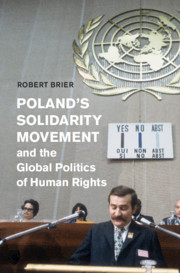Book contents
- Poland’s Solidarity Movement and the Global Politics of Human Rights
- Human Rights in History
- Poland’s Solidarity Movement and the Global Politics of Human Rights
- Copyright page
- Dedication
- Contents
- Acknowledgments
- Note on Geographical Regions
- Note on Cited Primary Documents
- Abbreviations
- Introduction
- 1 The Rise of Dissent in Poland
- 2 Dissent and the Politics of Human Rights
- 3 The Principle of Noninterference as Laid Down in the Helsinki Final Act
- 4 The End of the Ideological Age
- 5 Solidarity, Human Rights, and Anti-Totalitarianism in France
- 6 The “Bedrock of Human Rights”
- 7 Letters from Prison
- 8 Lech Wałęsa, the Symbolism of the Nobel Peace Prize, and Global Human Rights Culture
- 9 General Pinochecki
- 10 Human Rights and the End of the Cold War
- Epilogue
- Bibliography
- Index
- Poland’s Solidarity Movement and the Global Politics of Human Rights
- Human Rights in History
- Poland’s Solidarity Movement and the Global Politics of Human Rights
- Copyright page
- Dedication
- Contents
- Acknowledgments
- Note on Geographical Regions
- Note on Cited Primary Documents
- Abbreviations
- Introduction
- 1 The Rise of Dissent in Poland
- 2 Dissent and the Politics of Human Rights
- 3 The Principle of Noninterference as Laid Down in the Helsinki Final Act
- 4 The End of the Ideological Age
- 5 Solidarity, Human Rights, and Anti-Totalitarianism in France
- 6 The “Bedrock of Human Rights”
- 7 Letters from Prison
- 8 Lech Wałęsa, the Symbolism of the Nobel Peace Prize, and Global Human Rights Culture
- 9 General Pinochecki
- 10 Human Rights and the End of the Cold War
- Epilogue
- Bibliography
- Index
Summary
This chapter uses the book's main findings to draw broader conclusions on the history of human rights and the place of human rights in post-Cold War international politics. It makes three points. First, it argues that the events described in this book were harbingers of the pivotal role human rights came to play in post-Cold War global politics. Second, however, it shows that human rights discourses changed considerably during the 1990s. The ideas about collective agency and social self-organization which had been at the center of Polish, French, and US human rights discourses disappeared for the sake of a human rights vernacular centered on how powerful international actors supported helpless victims in distant countries. Third, the chapter concludes that these changes do not mean that the origins of human rights really lie in the 1990s. It argues instead that the very power of human rights derived from how actors could adopt them to different aims and political projects. The history of human rights shouldtherefore not be about the quest for a moment when human rights took on a definite meaning ad established clear-cut practices but about the conditions under which human rights became plausible and useful and were reinterpreted as historical actors adapted them to their needs.
- Type
- Chapter
- Information
- Publisher: Cambridge University PressPrint publication year: 2021

